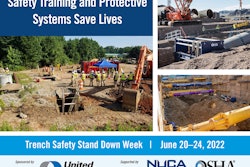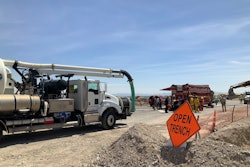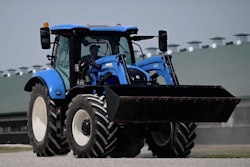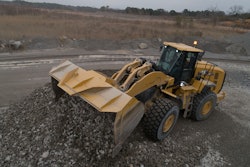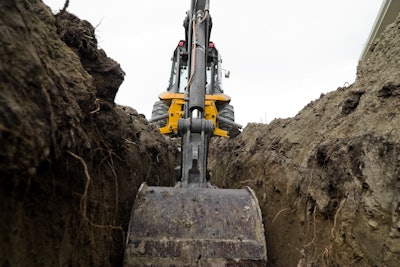
The first six months of 2022 have been deadly for workers in trenches, with 22 fatalities, and more have been reported since.
The U.S. Occupational Safety & Health Administration says it is alarmed at the spike, which has already surpassed all worker trench deaths in 2021, and is considering referring cases for criminal prosecution as part of a stronger crackdown on trenching violations. OSHA announced its “enforcement staff will consider every available tool at the agency’s disposal.”
It says that will include putting more emphasis on “how agency officials evaluate penalties for trenching and excavation-related incidents, including criminal referrals for federal or state prosecution to hold employers and others accountable when their actions or inactions kill workers or put their lives at risk.”
OSHA inspectors are also on tap to perform more than 1,000 trench inspections this year “where they may stop by, and inspect, any excavation site during their daily duties.”
Alarming number of fatalities
In the first half of this year, 22 workers died from hazards associated with trench and excavation work, OSHA says.
"Every one of these tragedies could have been prevented had employers complied with OSHA standards," says OSHA Assistant Secretary Doug Parker. "There simply is no excuse for ignoring safety requirements to prevent trench collapses and cave-ins, and leaving families, friends and co-workers to grieve when the solutions are so well-understood."
In July, four more workers have died, according to news reports, bringing the total to at least 26 deaths since January 1.
That’s the most on record, so far, since 2016, a year when 33 workers died in trench collapses. That year’s fatality total has been the highest in 16 years.
Recent deaths include double fatalities in Texas and Washington, as well as fatal collapses in Connecticut and North Carolina.
In its announcement, OSHA singled out a June 28 incident in Jarrell, Texas, in which two workers were buried alive after a 20-foot-deep, 2-foot-wide trench collapsed. Trench shields that could have saved their lives were on site but were not used on the sewer installation project, OSHA says.
According to news reports, the recovery operation took 23 hours. The victims were identified as Jimmy Lee Alvarado, 20, and Jose Vargas Ramirez, 39, of Florence, Texas. OHSA’s online inspection notification lists site-preparation contractor Wbw Construction LLC of Georgetown, Texas.
Deaths in July are as follows:
- July 4: Two men died in a 20-foot-deep trench in Shoreline, Washington, during a sewer repair project, according to news reports. The victims were identified as David Ameh, 66, and Demetrius Sellers, 33. Ameh owned Peacefield Construction, and Sellers was an employee.
- July 5: Joshua Kerry Brindle, 30, died in a trench collapse in Stanly County, North Carolina, on a site development project for a new residential subdivision. OSHA’s online inspection notification lists site-preparation contractor Brindle Site Services Inc. of Midland, North Carolina.
- July 22: Dennis Slater, 56, was buried in a trench collapse in Vernon, Connecticut, at a new housing development. He was removed from the trench by emergency workers but died at the hospital, according to news reports. OHSA’s online inspection notification lists site-preparation contractor Botticello Inc. of Manchester, Connecticut.
Criminal prosecution
Criminal prosecution of employers for fatal trench incidents is not common, but sometimes occurs.
One recent example was the sentence of a West Seattle contractor to 45 days in jail after one of his workers died in a trench collapse in 2016. The sentence was a first in Washington state history. In another recent case, manslaughter charges were filed against five employees at a Washington wind farm site where a worker died in a cave-in in 2020; those charges were dismissed this year.
Advocates for more criminal enforcement in trench death cases argue that such fatalities are preventable if employers follow the rules, which include using some form of cave-in prevention, such as trench boxes, shoring or sloping. Trenches must also be inspected before workers are allowed to enter to ensure safety.
“There is no reason – ever – for a worker to die unprotected in a trench collapse,” says Jessica E. Martinez, co-executive director for the National Council for Occupational Safety and Health. “Workers have been building trenches for literally thousands of years. We know how to do it safely: Slope the trench at a safe angle, shore it up, or shield workers with appropriate safety equipment.”
“Any employer that doesn’t follow these well-established safety protocols is putting workers’ lives at risk,” she adds. “If a worker is injured or killed in a trench, that’s no accident, it’s a crime – and it should be prosecuted.”
How to prevent cave-ins
Trenches 5 feet or deeper require some form of protective systems. Industry safety experts refer to the three S’s – shield, shore or slope – to safeguard workers in trenches or excavations.
Soil piles and other materials must be at least 2 feet from the edge of a trench. Along with required inspections before workers enter, trenches must be free of standing water and atmospheric hazards. Workers also have to be provided a safe way to enter and exit trenches.
Trench collapses happen rapidly, leaving workers little to no time to react.
"In a matter of seconds, workers can be crushed and buried under thousands of pounds of soil and rocks in an unsafe trench,” Parker says.
OSHA is also providing resources to help employers comply with trenching and excavation standards:
- The On-Site Consultation Program provides free and confidential health and safety consulting for small and medium-sized businesses.
- OSHA's trenching and excavation webpage provides additional information on trenching hazards and solutions, including a safety video.
- Workers who are being required to work in or beside unprotected trenches of 5 feet deep or more can contact their local OSHA or state plan office, or call 800-321-OSHA.
"The Occupational Safety and Health Administration is calling on all employers engaged in trenching and excavation activities to act immediately to ensure that required protections are fully in place every single time their employees step down into or work near a trench," Parker said. “The alarming increase in the number of workers needlessly dying and suffering serious injuries in trenching incidents must be stopped."





